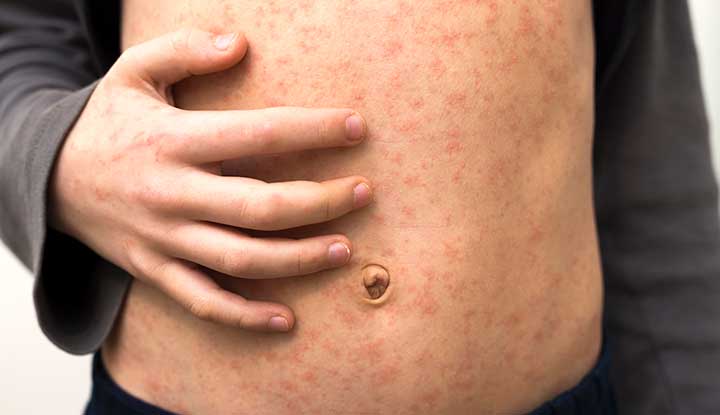Introduction
Measles is often thought of as a childhood disease, but adults are not immune to its dangers—especially if they have never been vaccinated or previously infected. Measles in adults can be more severe than in children, with a higher likelihood of complications and longer recovery times. Global travel, declining vaccination rates, and occasional outbreaks mean that unprotected adults remain at significant risk.
Why Adults Can Still Get Measles
- Lack of Vaccination: Adults born before widespread vaccination programs (or those who missed doses) may have no immunity.
- Waning Immunity: While rare, some individuals vaccinated decades ago may experience reduced immunity if they only received one dose.
- International Exposure: Travel to regions where measles is still common increases the risk of infection.
Risks of Measles in Adults
1. Increased Complication Rates
- Adults are more likely than children to experience severe complications such as pneumonia, hepatitis, and encephalitis.
- Recovery often takes longer, and hospitalizations are more common.
2. Higher Mortality Risk
- While measles can be deadly at any age, adults—especially those with weakened immune systems—have a higher case fatality rate compared to healthy children.
3. Greater Impact on Daily Life
- Adults with measles typically require longer periods away from work, which can cause financial and professional strain.
- The illness can lead to significant fatigue for weeks, even after other symptoms have resolved.
Severity of Measles in Adults
1. Symptom Intensity
- Fever: Often higher and longer-lasting in adults.
- Rash: May be more extensive and accompanied by intense itching.
- Respiratory Symptoms: Persistent cough and sore throat are common and can be severe.
2. Common Adult Complications
- Pneumonia: The leading cause of measles-related deaths in adults.
- Encephalitis: Brain inflammation that can cause seizures, confusion, or permanent damage.
- Hepatitis: Temporary liver inflammation may occur.
- Pregnancy Risks: Measles during pregnancy increases the risk of miscarriage, premature birth, and low birth weight.
3. Long-Term Effects
- Measles can weaken the immune system for months, leaving adults vulnerable to other infections.
- Rarely, subacute sclerosing panencephalitis (SSPE) can develop years later, leading to fatal brain degeneration.
Prevention and Protection
- Vaccination: Adults without documented immunity should receive two doses of the MMR vaccine.
- Travel Precautions: Get vaccinated before visiting countries where measles is still common.
- Herd Immunity: Maintaining high community vaccination rates protects vulnerable populations.
Conclusion
Measles in adults is not only possible but often more dangerous than in children. The risks include severe complications, longer recovery times, and higher hospitalization rates. Fortunately, measles is preventable with the MMR vaccine, which remains the best defense. Adults should ensure their immunization status is up-to-date—especially before traveling—to protect themselves and their communities.
FAQs
Can adults get measles even if they had it as a child?
No. Natural infection usually provides lifelong immunity.
Is measles more dangerous for adults?
Yes. Adults face a higher risk of severe complications like pneumonia and encephalitis.
What should adults do if exposed to measles?
Seek medical advice immediately; vaccination within 72 hours may help prevent illness.
Can pregnant women get the MMR vaccine?
No. Pregnant women should wait until after delivery to receive the vaccine.
How long does recovery from measles in adults take? Most recover in 2–3 weeks, but fatigue may last longer






